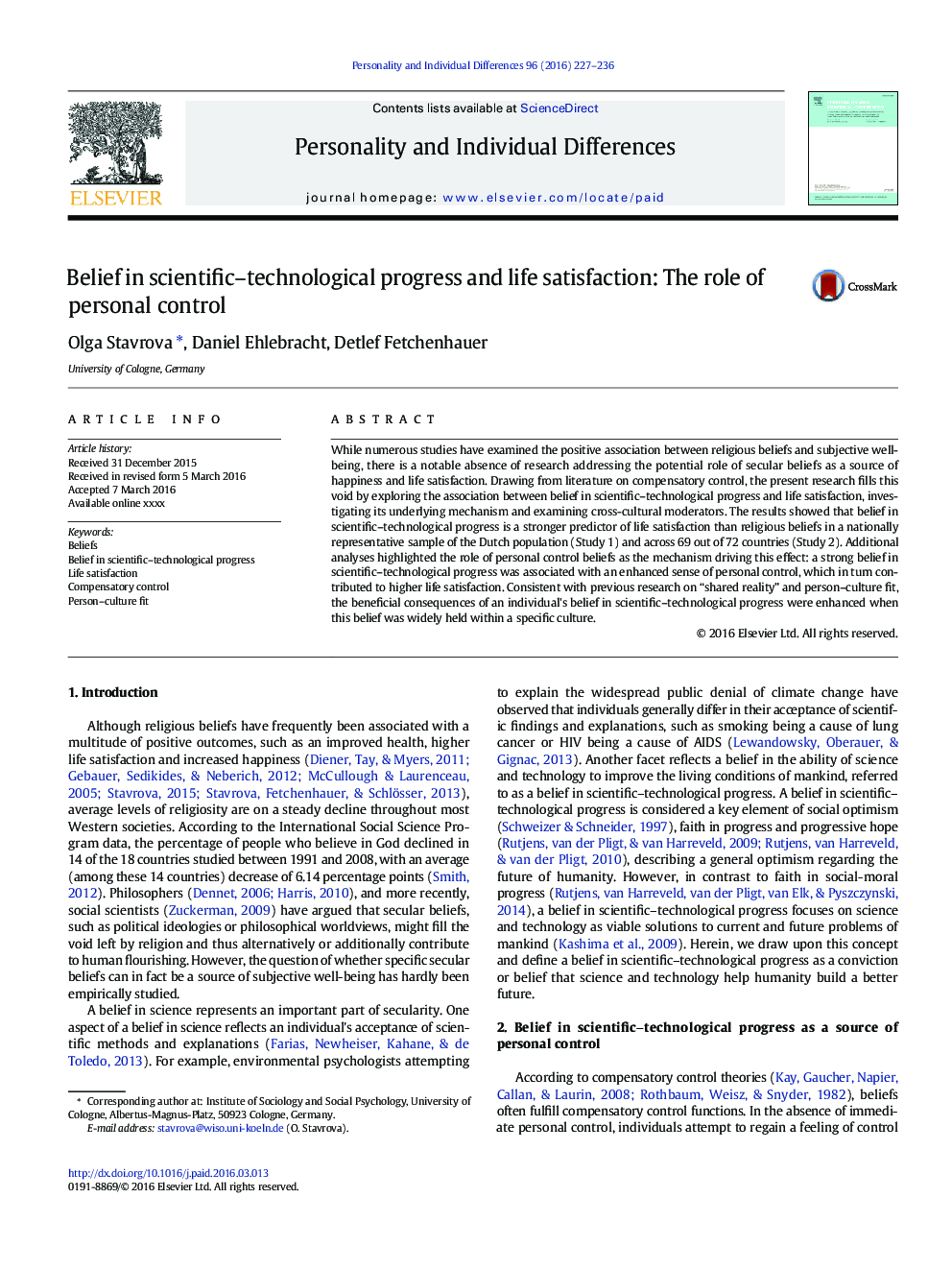| کد مقاله | کد نشریه | سال انتشار | مقاله انگلیسی | نسخه تمام متن |
|---|---|---|---|---|
| 7250150 | 1472022 | 2016 | 10 صفحه PDF | دانلود رایگان |
عنوان انگلیسی مقاله ISI
Belief in scientific-technological progress and life satisfaction: The role of personal control
ترجمه فارسی عنوان
اعتقاد به پیشرفت علمی-فن آوری و رضایت از زندگی: نقش کنترل شخصی
دانلود مقاله + سفارش ترجمه
دانلود مقاله ISI انگلیسی
رایگان برای ایرانیان
کلمات کلیدی
باورها، اعتقاد به پیشرفت علمی؟ رضایت از زندگی، کنترل جبرانی، شخص مناسب فرهنگ
ترجمه چکیده
در حالیکه مطالعات متعددی رابطه مثبت بین اعتقادات مذهبی و رفاه ذهنی را مورد بررسی قرار داده اند، فقدان قابل توجهی از تحقیق در مورد نقش بالقوه باورهای سکولار به عنوان منبع شادی و رضایت از زندگی وجود دارد. با توجه به ادبیات در مورد کنترل جبرانی، پژوهش حاضر با بررسی رابطه بین اعتقاد به پیشرفت علمی-تکنولوژیکی و رضایت از زندگی، بررسی مکانیزم پایه و بررسی مدیتران متقابل فرهنگی، این خالی را پر می کند. نتایج نشان داد که اعتقاد به پیشرفت علمی و تکنولوژیک، پیش بینی کننده رضایت زندگی قوی تر نسبت به باورهای مذهبی در نمونه ی ملی نماینده جمعیت هلندی (مطالعه 1) و در 69 مورد از 72 کشور (مطالعه 2) است. تجزیه و تحلیل های اضافی نقش اعتقادات کنترل شخصی را به عنوان مکانیسم رانندگی این اثر برجسته کرده است: اعتقاد قوی به پیشرفت علمی-تکنولوژیکی با درک حساسیت کنترل شخصی ارتباط دارد که به نوبه خود باعث افزایش رضایت از زندگی می شود. مطابق با تحقیق قبلی در مورد واقعیت مشترک؟ و فرهنگ شخصی مناسب است، پیامد های مثبت باور فرد به پیشرفت علمی-تکنولوژیکی افزایش یافته است، زمانی که این باور به طور گسترده در یک فرهنگ خاص برگزار شد.
موضوعات مرتبط
علوم زیستی و بیوفناوری
علم عصب شناسی
علوم اعصاب رفتاری
چکیده انگلیسی
While numerous studies have examined the positive association between religious beliefs and subjective well-being, there is a notable absence of research addressing the potential role of secular beliefs as a source of happiness and life satisfaction. Drawing from literature on compensatory control, the present research fills this void by exploring the association between belief in scientific-technological progress and life satisfaction, investigating its underlying mechanism and examining cross-cultural moderators. The results showed that belief in scientific-technological progress is a stronger predictor of life satisfaction than religious beliefs in a nationally representative sample of the Dutch population (Study 1) and across 69 out of 72 countries (Study 2). Additional analyses highlighted the role of personal control beliefs as the mechanism driving this effect: a strong belief in scientific-technological progress was associated with an enhanced sense of personal control, which in turn contributed to higher life satisfaction. Consistent with previous research on “shared reality” and person-culture fit, the beneficial consequences of an individual's belief in scientific-technological progress were enhanced when this belief was widely held within a specific culture.
ناشر
Database: Elsevier - ScienceDirect (ساینس دایرکت)
Journal: Personality and Individual Differences - Volume 96, July 2016, Pages 227-236
Journal: Personality and Individual Differences - Volume 96, July 2016, Pages 227-236
نویسندگان
Olga Stavrova, Daniel Ehlebracht, Detlef Fetchenhauer,
